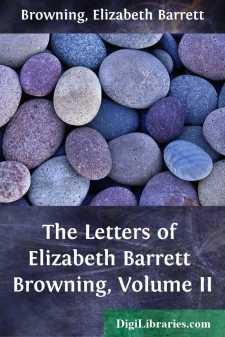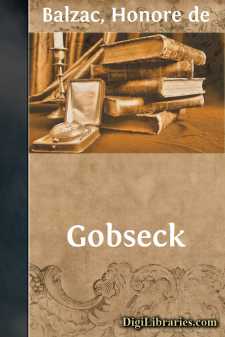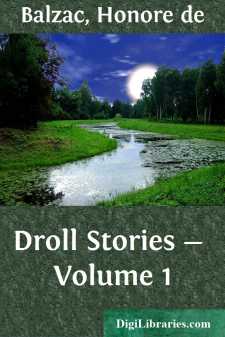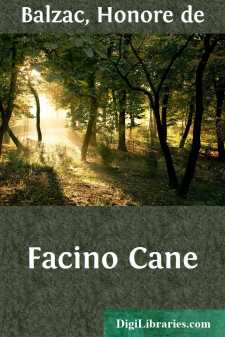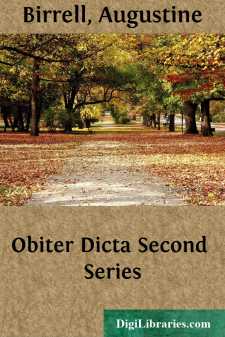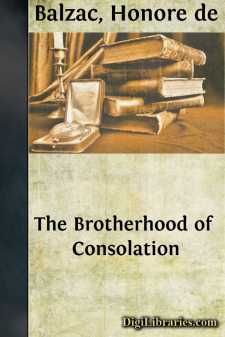Literary Collections
- American 84
- Ancient, Classical & Medieval 14
- Asian 1
- Australian & Oceanian 1
- Canadian 55
- Continental European 121
- English, Irish, Scottish, Welsh 179
- Essays 160
- General 24
- Letters 46
- Middle Eastern 1
Literary Collections Books
Sort by:
by:
Honore de Balzac
CHAPTER I On a cold morning in December, towards the close of the year 1612, a young man, whose clothing betrayed his poverty, was standing before the door of a house in the Rue des Grands-Augustine, in Paris. After walking to and fro for some time with the hesitation of a lover who fears to approach his mistress, however complying she may be, he ended by crossing the threshold and asking if Maitre...
more...
INTRODUCTION A section of a long and splendid literature can be most conveniently treated in one of two ways. It can be divided as one cuts a currant cake or a Gruyère cheese, taking the currants (or the holes) as they come. Or it can be divided as one cuts wood—along the grain: if one thinks that there is a grain. But the two are never the same: the names never come in the same order in actual time...
more...
CHAPTER VII Since they first settled in Florence the Brownings had made no long or distant expeditions from their new home. Their summer excursions to Vallombrosa, Lucca, or Siena had been of the nature of short holidays, and had not taken them beyond the limits of Tuscany. Now they had planned a far wider series of travels, which, beginning with Rome, Naples, Venice, and Milan, should then be extended...
more...
by:
Honore de Balzac
GOBSECK It was one o'clock in the morning, during the winter of 1829-30, but in the Vicomtesse de Grandlieu's salon two persons stayed on who did not belong to her family circle. A young and good-looking man heard the clock strike, and took his leave. When the courtyard echoed with the sound of a departing carriage, the Vicomtesse looked up, saw that no one was present save her brother and a...
more...
by:
Bret Harte
THE LAST GUN AT SNAKE RIVER. What had been in the cool gray of that summer morning a dewy country lane, marked only by a few wagon tracks that never encroached upon its grassy border, and indented only by the faint footprints of a crossing fox or coon, was now, before high noon, already crushed, beaten down, and trampled out of all semblance of its former graciousness. The heavy springless jolt of...
more...
by:
Helen Clergue
CHAPTER 1. GEORGE SELWYN—HIS LIFE, HIS FRIENDS, AND HIS AGE During the latter half of the eighteenth century no man had more friends in the select society which comprised those who were of the first importance in English politics, fashion, or sport, than George Selwyn. In one particular he was regarded as supreme and unapproachable; he was the humourist of his time. His ban mots were collected and...
more...
by:
Honore de Balzac
TRANSLATORS PREFACE When, in March, 1832, the first volume of the now famous Contes Drolatiques was published by Gosselin of Paris, Balzac, in a short preface, written in the publisher's name, replied to those attacks which he anticipated certain critics would make upon his hardy experiment. He claimed for his book the protection of all those to whom literature was dear, because it was a work of...
more...
by:
Honore de Balzac
FACINO CANE I once used to live in a little street which probably is not known to you—the Rue de Lesdiguieres. It is a turning out of the Rue Saint-Antoine, beginning just opposite a fountain near the Place de la Bastille, and ending in the Rue de la Cerisaie. Love of knowledge stranded me in a garret; my nights I spent in work, my days in reading at the Bibliotheque d'Orleans, close by. I lived...
more...
I am sorry not to have been able to persuade my old friend, George Radford, who wrote the paper on ‘Falstaff’ in the former volume, to contribute anything to the second series of Obiter Dicta. In order to enjoy the pleasure of reading your own books over and over again, it is essential that they should be written either wholly or in part by somebody else. Critics will probably be found ready to...
more...
by:
Honore de Balzac
I. THE MALADY OF THE AGE On a fine evening in the month of September, 1836, a man about thirty years of age was leaning on the parapet of that quay from which a spectator can look up the Seine from the Jardin des Plantes to Notre-Dame, and down, along the vast perspective of the river, to the Louvre. There is not another point of view to compare with it in the capital of ideas. We feel ourselves on the...
more...




